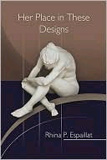May 5, 2009HER PLACE IN THESE DESIGNS
Review by Donald Mace Williams
Truman State University Press
100 E. Normal St.
Kirksville, MO 63501-4221
ISBN: 978-1-931112-89-5
2008, 91 pp., $15.95
http://tsup.truman.edu
If this book is feminist, as its name and the beautiful cover sculpture of a nude woman (by the poet’s husband, Alfred Moskowitz) may suggest, the feminism is that of a woman happy in her motherhood, her marriage, and her home—though not always in her housekeeping, I gather—and warm in memories of her parents. Is she happy also with the world, or with God? Not always. She writes, in “Kinderszenen,” about
those God did not wholly see:
that boy, for one, charred in the hotel bed
his father fled before he lit the flame;
And in “Case Study,” about
a woman whose one son went bad,
stole cash out of her purse, hunted and found
her wedding ring and sold it; all she had
he concentrated on a band around
his arm, a needle in his vein.
But both those poems, being sonnets like forty-seven of the eighty-five poems in the book, conclude with a semi-restoration, at least, of order.
Order, of course, characterizes Rhina P. Espaillat’s poetry. In this collection, nearly every poem is either metrical or syllabic, and there is a stretch of seventeen sonnets in a row, beginning with the wry-macabre “Trick or Treat.” There are sestinas, rich in thought and imagery, that sound like musical prose in spite of the repetitious end scheme, and villanelles that avoid the endemic monotony of the form by the similarly engrossing things they are saying and also by the wide liberties the poet takes with the words inside the repeated lines. Espaillat’s order never drones. It keeps encountering small discords, ironic parentheses, and surprising words. The feat of translating, for instance, in the poem by that name, is “echo dopplering off, off by a feather, / but circling back, miraculous, together.” Age, in “Entropy,” is the time when “each vertebra / scrapes at its mealy socket.” In the passionately earthbound “Body’s Weight,” the poet pleads, “Let there be anesthesia and fresh bread.”
It’s not surprising, since the poet spent her first seven years in the Dominican Republic, that two of the poems are in both Spanish and English versions. I’m guessing that the Spanish—“Canción Penúltima” and “Hoy Me Pregunto”—came first, since their rhyme schemes are tighter than those of “Next-to-last Song” and “Lately I’ve Wondered.” And translation naturally recurs as a subject. This is the last poem in the book, “On the Impossibility of Translation”:
Of course impossible, transmuting touch
and color into sound, sound into sign,
sign into sense again and back: too much
struggling after the names for flavor, line,
knowing they can’t be found, no, not in one
language: in two? across the grain of speech?
Unthinkable! Easier to fold the sun
into its syllable. Yet lovers, each
mute in one skin, can learn to speak in tongues,
speak themselves whole, if only once; you’ve heard,
fitful above the fields, the summer sung
in high, cascading turns of fluent Bird,
and seen, in shallow pools in every town,
how rain translates the sky and writes it down.
Such a turn from impossible to triumphant is typical of this collection, though in many of the poems the turn is more tentative, the triumph more like a wistful hope. The satisfaction to the reader is not so much in the ideas as in the expertness with which Espaillat enacts them in her forms—another kind of translating, scarcely new with her but still valid to those who will ride along with it, just as it was in the times of Coleridge or Dickinson or Frost.
Except when she openly assumes a persona, such as that of Helen of Troy or Andromache, Espaillat seems to be writing from her own life and in her own person. So it’s especially warming to come across poems about her parents, grandparents, and sons. Her husband appears, too, as in “The Poet’s Husband Engages in Gourmet Cooking,” the wryest and funniest thing in the book. All the poems, as widely as they range, speak with the same womanly and very human voice. This is a wonderful book.